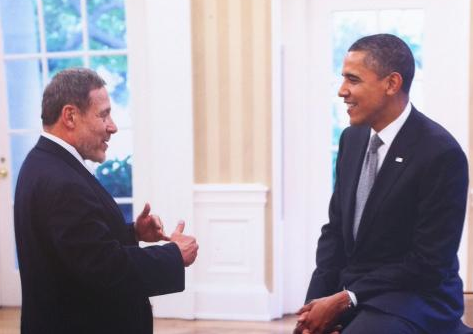Stanley Kurtz, who traced Barack Obama‚s left-wing political origins in Radical-in-Chief (2010), is releasing a new and powerful follow-up this week: Spreading the Wealth: How Obama is Robbing the Suburbs to Pay for the Cities. Kurtz demonstrates that Obama’s early political goals included redistributing suburban wealth–and that he is working closely with old community organizing allies to implement that program as president.
When Andrew Breitbart launched “The Vetting,” his aim was not only to highlight the radical past that the mainstream media had obscured when promoting Barack Obama, but also to show how Obama’s early ideas were the key to understanding his policies in office thus far, as well as his plans for a second term. Spreading the Wealth does that–and more, revealing new insights into some of Obama’s most notorious Chicago allies.
The story begins with Obama’s early mentors in Chicago, including Mike Kruglik (above with Obama), one of the three organizers Obama “compressed” into the “composite” of Marty Kaufman in his first memoir, Dreams from My Father (a deeply anti-suburban book, Kurtz points out). Obama joined Kruglik and other organizers to set up the Gamaliel Foundation, a radical front that turned its attention to the suburbs as a primary target in the 1990s.
Obama used his position on the board of the Woods Fund, where he served with Bill Ayers, to funnel money to Gamaliel and related efforts. As he entered electoral politics, he was also able to play “good cop” to Gamaliel’s “bad cop,” manipulating external pressure to “organize” his legislative colleagues to come around to his point of view–a strategy he would later attempt on a national scale in the Obamacare debate of 2009.
Unlike Ayers and other radicals, whom Obama was forced to abandon in 2008 as their role became more well known, Kruglik and Gamaliel managed to stay involved with the Obama transition team and his administration. Today, Kruglik runs a new organization known as Building One America, which meets with key Obama officials–including the president himself–and makes use of new federal programs and planning initiatives.
Under the guise of what they euphemistically refer to as “regionalism” or “regionalization,” Kruglik and Obama intend to help troubled cities seize control of the suburban tax base, as well as ending local control of education and other services. The goal, ostensibly, is to help poor and isolated groups left behind in the inner city–though their commitment to radical redistribution of wealth, and federal government power, is the real motivation.
Kurtz notes that the regionalists‚ ideas about the suburbs are decades out of date–that suburbs are rapidly integrating as upwardly mobile people of all backgrounds move out of cities ruined by Democrat mis-governance. The danger, he warns, of undoing good schools and reliable public services is that Kruglik and his allies–including Obama–are removing one of the key pathways for minorities to achieve the American dream.
The response to Kurtz’s convincing and well-researched book is predictable. Obama’s defenders will call it racist–just as his friends in Hollywood have spent two decades reinforcing the idea that the suburbs are havens for bigotry and greed. But there is no denying that Obama’s anti-suburban ideas are deeply rooted in his intellectual past–or that others have noted his intentions. No book will do more to change the 2012 debate.

COMMENTS
Please let us know if you're having issues with commenting.